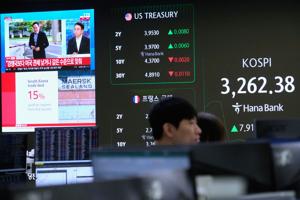The financial markets experienced a significant upswing today, propelled by robust performances from major technology corporations, pushing benchmark indexes toward new record highs. This surge reflects a renewed investor confidence in the tech sector’s growth trajectory and its pivotal role in the broader economic landscape.
Meta Platforms, the parent company of Facebook and Instagram, emerged as a key driver of the market’s ascent, witnessing a substantial 12.2% increase in its stock value. This impressive rally followed the company’s announcement of sales and profit figures that significantly surpassed Wall Street’s expectations, despite its continued multi-billion dollar investment into advanced artificial intelligence initiatives.
Concurrently, Microsoft’s stock climbed 4.6% after it also reported stronger-than-anticipated financial results. Investors were particularly encouraged by an optimistic update concerning the Azure cloud computing platform, a cornerstone of Microsoft’s extensive artificial intelligence endeavors, underscoring the vital connection between technological innovation and market valuation.
The broader technology sector has consistently acted as a primary catalyst for market gains, fueled by persistent enthusiasm for the transformative potential of artificial intelligence. Beyond tech, earnings reports remained a central theme, with companies like CVS Health also reporting strong results, indicating a resilient corporate financial environment across various sectors.
Amidst these corporate successes, the latest economic data revealed a slight uptick in inflation, as measured by the personal consumption expenditures index, the Federal Reserve’s preferred gauge. The annual pace of inflation reached 2.7% year-over-year, marginally exceeding economists’ forecasts and representing an increase from the 2.4% observed in May.
Adding to the economic complexities, ongoing uncertainties surrounding tariffs continue to influence business projections. Major corporations, including automotive giant Ford and confectionery leader Hershey’s, have recently voiced concerns regarding the adverse impact of import taxes on their current financial outcomes and future forecasts, highlighting the volatility of global trade policies.
In response to these mixed signals of inflation and trade policy, the Federal Reserve has maintained a cautious stance on monetary policy, opting to hold interest rates steady through its last five meetings. The central bank’s persistent objective is to guide the inflation rate back down to its target of 2%, a level it has nearly achieved but where inflation remains stubbornly above.
Consequently, Wall Street has begun to adjust its expectations for imminent rate cuts, with projections for a reduction at the Federal Reserve’s upcoming September meeting significantly diminishing. Traders now foresee a markedly lower probability of a rate cut compared to forecasts from just a few weeks prior, reflecting a shift in market sentiment regarding the trajectory of interest rate policy.






Leave a Reply